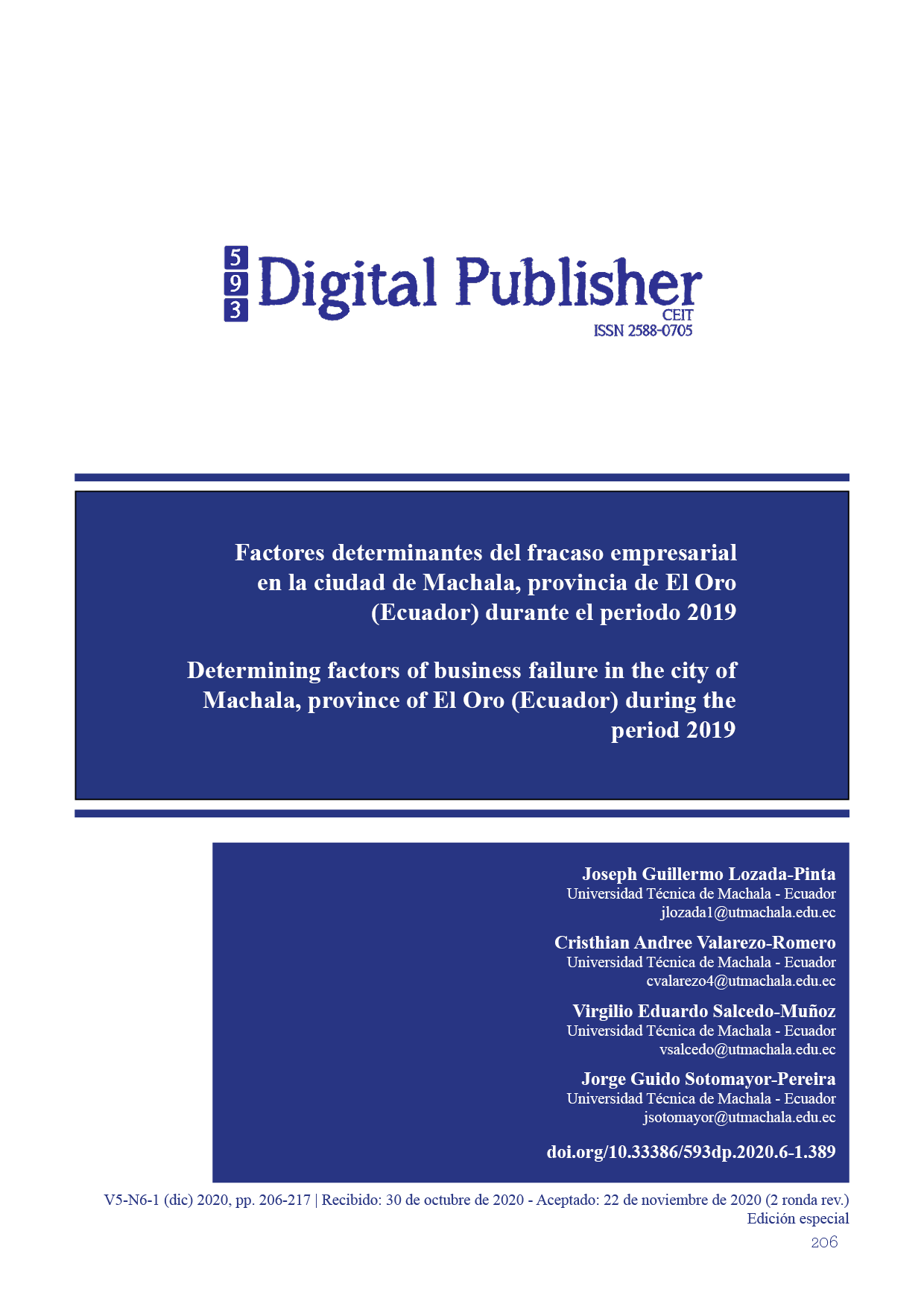Determining factors of business failure in the city of Machala, province of El Oro (Ecuador) during the period 2019
Main Article Content
Abstract
The present article aims to identify the main causes of business failure within the City of Machala, El Oro province, during the period 2019. The research has a descriptive approach, the technique used for data collection was the survey, through the application of a questionnaire of 15 questions addressed to 161 entrepreneurs, who closed their companies, which remained active during the period 2015-2019. The data obtained allowed to know which were the most significant factors that directly influenced the cessation of its operations, resulting in business failure being generated mainly due to the fact that unexpected problems arise within organizations (legal, economic, among others), little help from financial institutions / entities, high level of competition, lack of liquidity and lack of business training. The entrepreneur as the main manager of nascent companies must make intelligent and strategic decisions, for which they must have skills, knowledge, experience and above all adequate training, which allow them to reverse the effects of failure and turn them into a source of opportunity, development and success.
Downloads
Article Details

This work is licensed under a Creative Commons Attribution-NonCommercial-ShareAlike 4.0 International License.
1. Derechos de autor
Las obras que se publican en 593 Digital Publisher CEIT están sujetas a los siguientes términos:
1.1. 593 Digital Publisher CEIT, conserva los derechos patrimoniales (copyright) de las obras publicadas, favorece y permite la reutilización de las mismas bajo la licencia Licencia Creative Commons 4.0 de Reconocimiento-NoComercial-CompartirIgual 4.0, por lo cual se pueden copiar, usar, difundir, transmitir y exponer públicamente, siempre que:
1.1.a. Se cite la autoría y fuente original de su publicación (revista, editorial, URL).
1.1.b. No se usen para fines comerciales u onerosos.
1.1.c. Se mencione la existencia y especificaciones de esta licencia de uso.
References
Balcazar, J. (2015). Análisis de casos de los factores potenciales que están incidiendo en el fracaso de las pymes. Pág. 8. Machala, Ecuador. Obtenido de http://repositorio.utmachala.edu.ec/bitstream/48000/5209/1/ECUACE-2015-AE-CD0008.pdf
Banco Mundial. (2018). Banco Mundial. Obtenido de Banco Mundial: https://datos.bancomundial.org/indicator/IC.BUS.NREG
CAF. (2013). Emprendimientos en América Latina: Desde la subsistencia hacia la transformación productiva. Bogotá. Obtenido de https://ibce.org.bo/images/publicaciones/emprendimientos-america-latina.pdf
Delgado, D. D., & Chávez, G. P. (Abril de 2018). Las Pymes en el Ecuador y sus fuentes de financiamiento. Revista Observatorio de la Economía Latinoamericana, Pág. 2-3. Obtenido de https://www.eumed.net/rev/oel/2018/04/pymes-ecuador-financiamiento.html
Everett, J., & Watson, J. (1998). Small Business Failure and External Risk Factors. Small Business Economics. doi:10.1023/A:1008065527282
FLACSO. (2013). Estudios industriales de la micro, pequeña y mediana empresa. FLACSO. Quito: Gráficas V&M . Obtenido de https://biblio.flacsoandes.edu.ec/libros/digital/52089.pdf
GEDI. (2020). GEDI. Obtenido de GEDI: https://thegedi.org/
GEM. (2020). Global Entrepreneurship Monitor Ecuador 2019/2020. Análisis de datos, ESPOL, Guayaquil. Recuperado el Julio de 2020, de https://www.gemconsortium.org/latest-global-reports
Global Plus . (2019). Clasificación de compañías en la provincia de el oro. Informativo, Universidad Técnica de Machala , Machala. Obtenido de http://www.globalplus.ec/boletines/2019/Boletin_1.pdf?1.1
González, R., Arteaga , A., & del Rosario, M. (2018). Cierre empresarial en la región Laja- Bajío. Dialnet, Pág. 5. Obtenido de dialnet.unirioja.es/servlet/articulo?codigo=6559168
INEC. (2020). Instituto Nacional de Estadísticas y Censos. Obtenido de Instituto Nacional de Estadisticas y Censos: https://www.ecuadorencifras.gob.ec/institucional/home/
Jenkins, A., & McKelvie, A. (2016). What is entrepreneurial failure?. International Small Business Journal, Vol. 34, Pág. 176-188. doi:10.1177/0266242615574011
Justo, R. (2008). La influencia del género y entorno familiar en el éxito y fracaso de las iniciativas emprendedoras. Tesis Doctoral, Universidad Autónoma de Madrid, Madrid. Obtenido de https://repositorio.uam.es/bitstream/handle/10486/1811/5527_justo_rachida.pdf?sequence=1
Keasey , & Watson. (1987). Non‐Financial Symptoms and the Prediction of Small Company Failure: A Test of Argenti's Hypotheses. Journal of Business finance & Accounting. doi:https://doi.org/10.1111/j.1468-5957.1987.tb00099.x
Lopez, J., & Martínez, F. (2012). El proceso y resultado de la innovación y su efecto en el rendimiento de las pymes. Universidad de Cantabria . Académica española. Obtenido de http://www.aeca1.org/xvencuentroaeca/cd/87c.pdf
Marchan, K. (2009). Análisis de competencias y habilidades para que un usuario utilice herramientas de inteligencia de negocios en las pymes del ecuador. Tesis de Grado , ESPOL, Guayaquil.
OECD. (2019). oecd-ilibrary. Obtenido de oecd-ilibrary: https://www.oecd-ilibrary.org/industry-and-services/principios-de-gobierno-corporativo-de-la-ocde-2004_9788485482726-es
Oogfte, H., & De Prijcker, S. (2006). Failure processes and causes of company bankruptcy: a typotogy. Management Decision. doi:10.1108/00251740810854131
Orlandi, P. (2020). Las Pymes y su rol en el Comercio Internacional. Universidad de Palermo. Buenos Aires: CEDEX. Obtenido de https://www.palermo.edu/economicas/cedex/pdf/pyme_com_internacionall.pdf
Parra, J. F. (2011). Determinantes de la probabilidad de cierre de nuevas empresas en Bogotá. Scielo , Vol. XIX (Núm. 1), Pág. 31-32. Obtenido de http://www.scielo.org.co/pdf/rfce/v19n1/v19n1a03.pdf
Rafael , R., & Sacoto, V. (2017). Las pymes ecuatorianas: su impacto en el empleo como contribución del pib pymes al pib total. Espacios, Vol. 38(Núm. 53), Pág. 5. Obtenido de https://www.revistaespacios.com/a17v38n53/a17v38n53p15.pdf
SRI. (2020). SRI. Obtenido de SRI: https://www.sri.gob.ec/web/guest/home
SUPERCIAS. (2020). Superintendencia de compañías, valores y seguros. Obtenido de Superintendencia de compañias, valores y seguros: https://www.supercias.gob.ec/portalscvs/
Villegas, V., & Sánchez , J. (Julio de 2012). Las mipymes en el contexto mundial: sus particularidades en méxico. Revista de Ciencias Sociales de la Universidad Iberoamericana, Vol. 7(Núm. 14), Pág. 128-129. Obtenido de https://www.redalyc.org/articulo.oa?id=211026873005
Zamora, C. S. (2018). La importancia del emprendimiento en la economía: el caso de Ecuador. Revista Espacios, Vol. 39(Núm. 07), Pág. 2-3. Obtenido de https://www.revistaespacios.com/a18v39n07/a18v39n07p15.pdf





